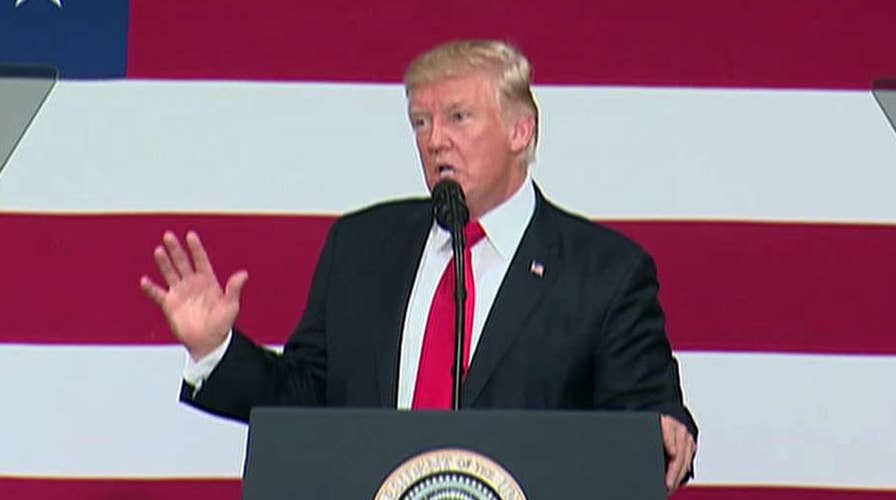Trump urges Congress to give him what he wants on tax reform
President pitches plan in Missouri; John Roberts reports from the White House
As the end of President Trump’s first year in office nears, Republicans are desperate for a victory. Following their failure to pass health care reform, polling shows they trail Democrats by nine percentage points in a generic 2018 House race. The GOP has one last hope to save its first year agenda: passing middle class and small business tax cuts.
Recent Gallup polling shows “significant” middle class tax cuts are supported by a sizable majority of Americans. For good reason. Too many hardworking taxpayers struggle to make ends meet.
Despite modest recent improvement, median wages have stagnated for most of this century. New survey data shows that four out of five full time employees are living paycheck-to-paycheck.
A recent Federal Reserve report finds that nearly half of Americans could not cover an unexpected $400 expense like a car repair or home appliance replacement. Meanwhile, health care, housing, and child care costs have skyrocketed. A tax cut is the most direct way to boost wages and provide these families some relief.
A tax cut for American small businesses, over which the economic recovery has largely passed, would do just as much good. It would allow small businesses to keep more of their earnings, reversing their decades-long decline and reinvigorating Main Streets in communities across the country.
Consider the results of a recent Job Creators Network nationwide poll of small business owners: Most respondents said they would reinvest their tax cut savings in the form of employee wage hikes, new hires, and expansion.
This suggests a tax cut could address the problem of stagnating wages twice. First, by directly giving all hardworking taxpayers an immediate raise in their take home pay. Second, by allowing small business employers the funds to provide a pay raise.
Whether your politics are left, right, or center, this is something we can all agree on: More money in more Americans’ pockets is a good thing for everyone.
More money in our communities and less shipped off to Washington D.C. would produce a major economic stimulus, helping the country get back to its historic economic growth rate above three percent. This economic growth would help offset the fiscal costs of a tax cut.
Americans have shouldered the costs of out-of-control Capitol Hill spending for too long. But rather than cut costs, Washington keeps hitting withdraw, withdraw, withdraw. The government treats taxpayer wages like a Take-a-Penny tray.
In order to highlight the substantial benefits of a tax cut for American small businesses, families, and communities, my organization, Job Creators Network, is launching a major tax cut campaign, which includes a nationwide bus tour with a rally stop at the IRS building in Washington D.C.
The message is simple: Pass a tax cut retroactive to January 1st and give working and middle class Americans a bigger paycheck by returning some of the money the government took from them last year – hundreds of dollars a month – to their wallets today.
Think of what a family of four could do with a few hundred extra dollars: cover unexpected expenses, keep up with out-of-control health care costs, buffer savings accounts, or even take a well-deserved vacation. And think of what a small business could do: raise wages for loyal employees, hire some weekend help, expand into new product lines, or give back to the community. It’s their money. They earned it. They should have the final say on how to spend it.
It’s time for Congress to come together and deliver results that actually matter at the dinner table. To recognize what hardworking taxpayers plainly need and deserve.
We’re not asking for a sweeping overhaul of the federal tax code. We’re not asking for a once-in-a-generation, bipartisan omnibus reform package. We’re asking for a simple, one-time tax cut that puts a few extra dollars back in people’s pockets in time for the holidays. By next year, it will be too late

